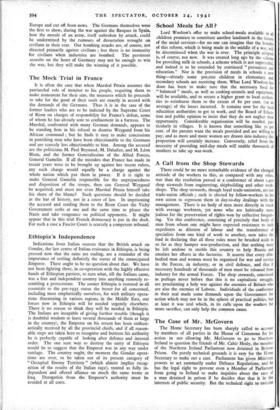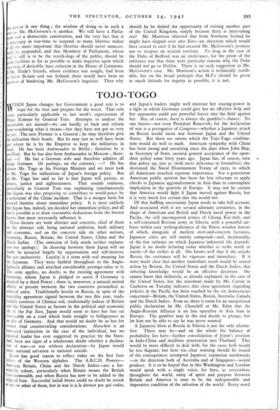The Case of Mr. McGovern
The Home Secretary has been sharply called to account by members of all parties in the House of Commons for his action in not allowing Mr. McGovern to go to Northern Ireland to question the friends of Mr. Cahir Healy, the member of the Northern Ireland Parliament now detained in Brixton Prison. On purely technical grounds it is easy for the Home Secretary to make out a case. Parliament has given Ministers powers to act summarily under Defence Regulations, and he has the legal right to prevent even a Member of Parliament from going to Ireland to make inquiries about the case of a man detained in prison if he decides that that is in the interests of public security. But the technical right to exercise • s power is one thing ; the wisdom of doing so in such a as Mr. McGovem's is another. We still have a Parlia- nt and a democratic constitution, and the very fact that it necessary in war-time to suspend so many liberties makes all the more important that liberties should never unneces- rily be suspended, and that Members of Parliament, whose uty it still is to be the watch-dogs of the public, should be ,en facilities as far as possible to make inquiries upon which y may, if desirable, base criticism in the House of Commons. Mr. Healy's friends, whose evidence was sought, had been Great Britain and not Ireland, there would have been no uestion of hindering Mr. McGovern's inquiries. Then why should he be denied the opportunity of visiting another part of the United Kingdom, simply because there is intervening sea? Mr. Morrison objected that from Northern Ireland he might have slipped over into Eire—an objection which would have ceased to exist if he had secured Mr. McGovern's promise not to trespass on neutral territory. To drag in the case of the Duke of Bedford was an irrelevance, for the point of the reference was that there were particular reasons why the Duke should not go to Dublin. There is no such suggestion in Mr. McGovern's case. Mr. Morrison's action is technically justifi- able, but on the broad principle that M.P.s should be given as much latitude for inquiry as possible, it is not.



























 Previous page
Previous page